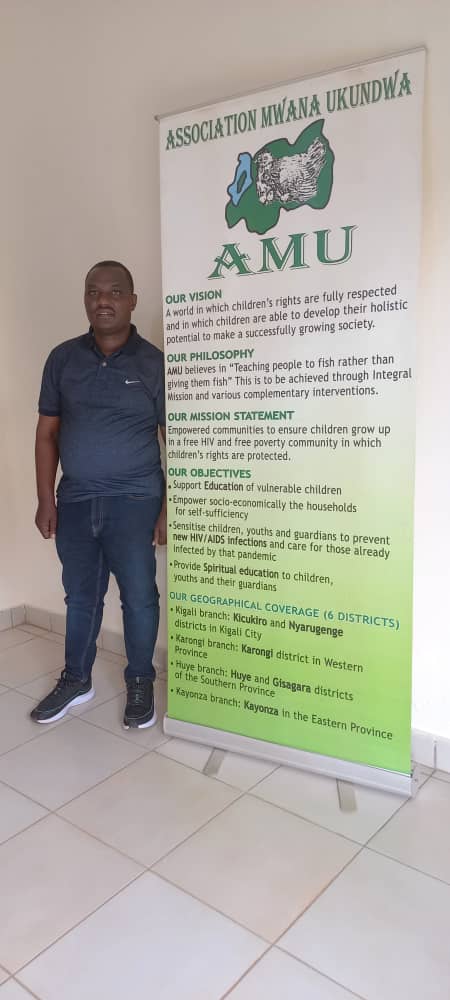Association Mwana Ukundwa South Branch: An Organization Helping Girls in Rwanda
Interview with Field Coordinator and Project Manager NTAKIRUTIMANA Jean d’ Amour
Interview by Floride Yamuragiye, Technical Advisor and Rwanda Country Representative

Association Mwana Ukundwa (AMU) is a non-profit Christian organization created in 1995 to help orphans of the 1994 war and genocide. From the beginning, AMU’s mission was “to contribute to the socioeconomic reintegration of children at risk, more particularly orphans, and to reinforce more capacity of children in foster families.” AMU is dedicated to the principle of teaching them how to fish, rather than giving fish to the people.
Their contributions/activities are based on these objectives:
- supporting the education of vulnerable children;
- empowering the socioeconomic status of the households for self-sufficiency;
- sensitizing children, youth, and guardians to prevent new HIV/AIDS infection and those already infected by that pandemic; and
- providing spiritual education to children, youths, and their guardians.
AMU currently operates in Rwanda throughout different branches in three regions of the country: South (Huye,Gisagara), West (Karongi), East (Kayonza), and at its headquarters in Kigali (Nyarugenge, Gasabo, and Kicukiro). Like other branches, in the Southern branch, there are many projects implemented in partnership with ACHIEVE Rwanda to enhance the mission of “empowering communities to ensure children grow up in a free HIV and poverty community in which children’s rights are protected.”
What is AMU doing to enable young girls to fulfill their goals?
As a result, in the process of supporting young girls to get at their fulfilled dreams, the organization provides education to them as a key that will make them opened to all opportunities in future. Apparently it broadened much to restoring the lost hope of young girls who became victims of violence, particularly sexual abuse. The organization integrated them in AMU TVET tailoring school south branch and gave them a six months full tailoring package. With this package, they were empowered at the level of competent and disciplined tailors with the capabilities of working at any tailoring-oriented industry not limited at initiating their own tailoring businesses. They were also trained to different disciplines of life such as reproductive system, spiritual-based life, and working in group. The trainings enabled them with the skills of working in groups toward community development stating from their individual self-resilience.
How that work is so important?
The work is imperative to young girls through empowering the young generation both children and youth, the nation of future indeed. They will valuably be able to reach self-sufficient society full of all required needs.
Why do you find it important to invest in girls’ education and their future?
Girls and women in general, they are the biggest part that make the entire world’s population as it is in Rwanda… Ignoring this large part of the world population can make no progress at all. Therefore, it is essential to invest in their education in order to give them key skills to development of their life. It is meaningless to ignore that big number and lead them exclusive in the process of development at large. To empower ladies is to develop the nation since they bear the life of the many… So their education is highly needed and very important to make sure that the nation gains knowledge on the way forward to bear the world’s people… [and] contribute in the process of making the world great again and favorable to everyone’s life. “Educating a lady is educating the generation.”
How can we hold ourselves accountable to build a brighter future for them?
These girls are most cases found in the group many societies call minorities and vulnerable. In this way, our accountability may be done in form of psychological and socioeconomic approaches whereby we can be monitoring them at their life after our direct intervention of educating them at TVET tailoring class. They may also be supported with the tool kits to help them get the means of applying the given skills. The life accompaniment in form of psychological counseling, medical cares like assisting them with medical insurance Mutuelle, civil registration of their kid since most of them are unwillingly born. More to that the accountability is still meaningful through assisting them in the courts to gain their lost justice and then offer to them trainings which will guarantee to them the knowledge about their rights as well as life incitements.
***
In celebration of International Day of the Girl Child, we asked staff to share their stories, their inspirations, and why they work so hard to advocate for girls’ rights.